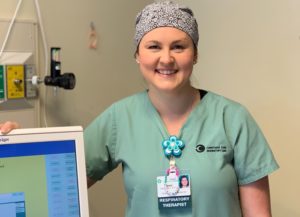Health care hero: Respiratory Therapist Annie Wolfskill
Caring for the most gravely ill coronavirus patients, helping their lungs heal and easing their breathing
We are shining a light on our #healthcareheroes. Meet Respiratory Therapist Annie Wolfskill, BS, RRT.
What inspires you to be a caregiver?
I have a passion for helping others and that led me to become a respiratory therapist. What inspires me is the ability to help my patients. Liberating someone from a ventilator, hearing them speak and seeing their smile for the first time is very rewarding.
How has your typical workday changed? What work are you doing or doing differently because of COVID-19?
As a respiratory therapist, I have been primarily working in the medical intensive care unit (ICU) that is caring for COVID-19 patients. Each day starts with a virtual huddle to discuss the most up-to-date information and policies regarding COVID-19. Many aspects around the ICU have changed. Donning and doffing our PPE properly is vital to containing the virus.
Acknowledging that it is OK to not be OK is important and utilizing your support system is crucial in maintaining your mental health.
Annie Wolfskill, BS, RRT
Limiting exposure to staff is also extremely important which could entail clustering care times with nurses to assist them with their needs for the patients. Teamwork has always been an important aspect in health care, but now more than ever we are uniting to help stop the pandemic. For COVID-19 patients, we are spending a lot of extra time managing the ventilator because oftentimes the COVID-19 patients are difficult to oxygenate and ventilate.
What is keeping you motivated during these uncertain times?
The communication and teamwork across the multidisciplinary teams have been beyond amazing. Everyone has come together during this time and shown how strong our frontline can be. What motivates me is knowing that I am making a difference in these patients lives with the help of my team.
What advice do you have for your fellow caregivers?
Going into work and knowing you are taking care of COVID-19 patients can be very overwhelming, stressful and can take a toll on your emotional health. Acknowledging that it is OK to not be OK is important, and utilizing your support system is crucial in maintaining your mental health.
What advice do you have for our community?
Be patient and follow your state’s guidelines for social distancing and prevention — whether that means wearing a mask out in public or limiting how often you leave the house. We all play a role in stopping the spread of this virus outside of the hospital, and it is important to stay informed and take precautions.
For local resources for your health and wellness, visit our coronavirus support page.
